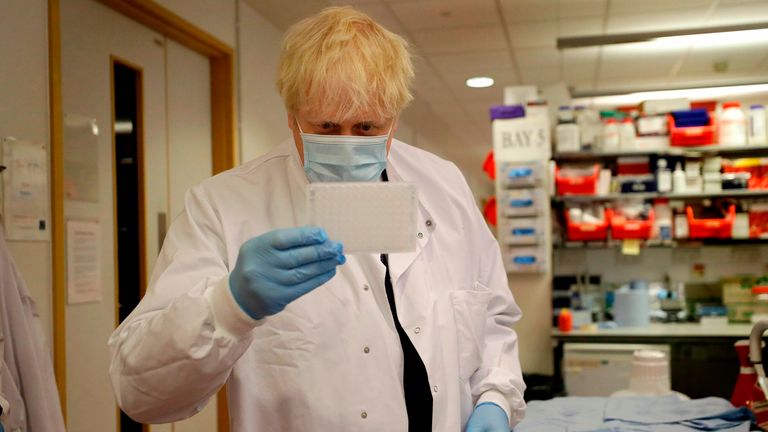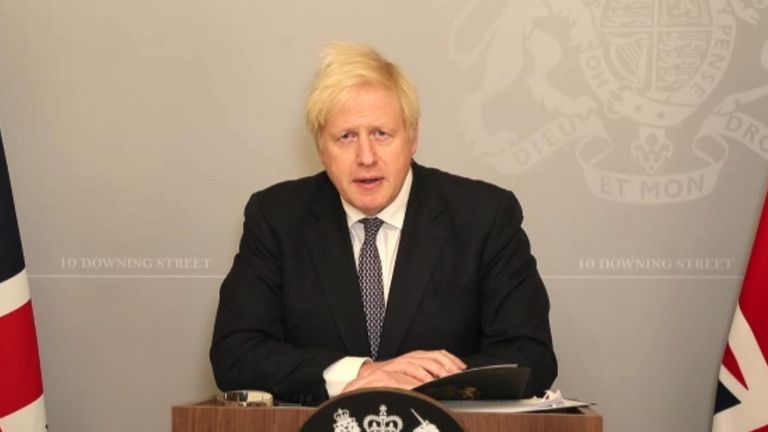Boris Johnson has suggested the "vast majority" of people most vulnerable to coronavirus could be vaccinated against the disease by Easter.
The prime minister, speaking at a Downing Street news conference, said this "would make a very substantial change" to how the UK is able to manage COVID-19.
With Oxford University's vaccine shown to be up to 90% effective, Mr Johnson said the roll-out of the jab "at a good lick" - perhaps in combination with two other vaccines developed by Pfizer/BioNTech and Moderna - should see the UK inoculate "the vast majority of people who need the most protection by Easter".
"That would make a very substantial change to where we are at the moment," he added.
"I don't want to give any more hostages to fortune than that, but that's the best information we have."
Mr Johnson said there would be "no compulsory vaccination", but branded the "propaganda" of anti-vaccination campaigners as "wrong" and urged everyone to get a vaccine "as soon as it is available".
He also said the UK is "not out of the woods yet" and warned the coming months "will be hard, they will be cold, they include January and February when the NHS is under its greatest pressure".
The prime minister vowed to "continue to bear down hard" on COVID and said now was "not the moment to let the virus rip for the sake of Christmas parties".
"'Tis the season to be jolly, but 'tis also the season to be jolly careful," Mr Johnson added.
The prime minister, following talks with the devolved administrations in Scotland, Wales and Northern Ireland, is expected to set out how families might be able to gather over the festive period later this week.
Earlier on Monday, Mr Johnson had told the House of Commons how a new "tougher" three-tiered system of restrictions - to be put in place until the end of March - would replace England's current national lockdown from 2 December.
At the news conference, the prime minister said the new tiering system - in combination with testing and the roll-out of vaccines - would "squeeze the virus in the weeks and months ahead".
"I really am now assured things really will look and feel very different indeed after Easter," he added.
England's chief medical officer, Professor Chris Whitty, also offered hope of more normality in people's lives after the winter months.
"Science and also the seasons, when we get through to spring, will help to de-risk this infection steadily, step-by-step," he told the news conference.
"And we'll be able to pull back from these really oppressive things we have to do socially and economically to keep it under control at the moment.
"The virus will not disappear, but it will become less and less risky for society."
Prof Whitty added coronavirus "may still cause problems, particularly in the winter months" but suggested there would no longer be a need for the strictest measures from next spring.
Professor Andrew Pollard, director of the Oxford Vaccine Group, said there was a "hint" in the data that his group's vaccine could help reduce the amount of asymptomatic infection.
"That may mean that there could be fewer people in the population who are spreaders," he said.
"And that starts to stop the virus in its tracks, if we can get there."
Prof Pollard admitted there was a "possibility" the virus could mutate, with surveillance in place around the world to monitor such a development.
He said it could be "relatively quick" to adapt vaccines to combat a mutation, but added it would be up to regulators to decide whether updated jabs would have to go through a full trial process once more.
https://news.google.com/__i/rss/rd/articles/CBMiiAFodHRwczovL25ld3Muc2t5LmNvbS9zdG9yeS9jb3ZpZC0xOS1ib3Jpcy1qb2huc29uLXN1Z2dlc3RzLXZhc3QtbWFqb3JpdHktb2YtdnVsbmVyYWJsZS1wZW9wbGUtY291bGQtZ2V0LWNvdmlkLXZhY2NpbmUtYnktZWFzdGVyLTEyMTQwNTg30gGMAWh0dHBzOi8vbmV3cy5za3kuY29tL3N0b3J5L2FtcC9jb3ZpZC0xOS1ib3Jpcy1qb2huc29uLXN1Z2dlc3RzLXZhc3QtbWFqb3JpdHktb2YtdnVsbmVyYWJsZS1wZW9wbGUtY291bGQtZ2V0LWNvdmlkLXZhY2NpbmUtYnktZWFzdGVyLTEyMTQwNTg3?oc=5
2020-11-23 20:48:45Z
52781203634009


Tidak ada komentar:
Posting Komentar